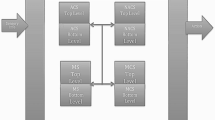Abstract
The CoTeSys cluster of excellence (Beetz et al. in Proceedings of the 30th German Conference on Artificial Intelligence, KI-2007, pp. 19–42, 2007) investigates cognition for technical systems such as robots and factories. Cognitive technical systems (CTS) are information processing systems equipped with artificial sensors and actuators, integrated and embedded into physical systems, and acting in a physical world. They differ from other technical systems as they perform cognitive control and have cognitive capabilities. Cognitive control orchestrates reflexive and habitual behavior in accord with longterm intentions. Cognitive capabilities such as perception, action, knowledge and models, reasoning, learning and planning turn technical systems into systems that “know what they are doing”. The cognitive capabilities result in systems of higher reliability, flexibility, adaptivity and better performance.




Similar content being viewed by others
Notes
CoTeSys is funded by the German Research Council DFG as a research cluster of excellence within the “excellence initiative”. CoTeSys partner institutions are: Technische Universität München (TUM), Ludwig-Maximilians-Universität (LMU), Universität der Bundeswehr (UBM), Deutsches Zentrum für Luft- und Raumfahrt (DLR) and Max-Planck-Institute for Neurobiology (MPI).
Indeed, Mitchell has pointed out in a recent presidential address at the National Conference on Artificial Intelligence that the next revolution is expected to be caused by the synergetic cooperation of the computing and the cognitive sciences.
CRAM is supported in the context of the Willow Garage PR2 Beta programme http://www.willowgarage.com/blog/2010/05/04/pr2-beta-program-recipients and already partly available as part of the tum-ros-pkg. More information about CRAM can be found at http://www.ros.org/news/2010/04/robots-using-ros-tum-rosie.html, http://ias.cs.tum.edu/research-areas/cram/cram and http://www.ros.org/wiki/cram.
References
Beetz M, Buss M, Wollherr D (2007) Cognitive technical systems—what is the role of artificial intelligence? In: Hertzberg J, Beetz M, Englert R (eds) Proceedings of the 30th German conference on artificial intelligence, KI-2007, pp 19–42. Invited paper
Author information
Authors and Affiliations
Corresponding author
Rights and permissions
About this article
Cite this article
Buss, M., Beetz, M. CoTeSys—Cognition for Technical Systems. Künstl Intell 24, 323–327 (2010). https://doi.org/10.1007/s13218-010-0061-z
Published:
Issue Date:
DOI: https://doi.org/10.1007/s13218-010-0061-z




